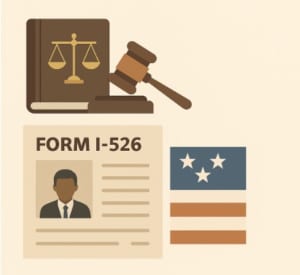A nonimmigrant visa is for persons wanting to enter the U.S. for a temporary visit for a specific purpose, and who will return to their home country or country of residence when the purpose of their visit is finished. In most nonimmigrant visa categories, the person establishes and maintains what is called “nonimmigrant intent”, which is the intent to return to his or her home country when the purpose of his or her visit is complete. The most common nonimmigrant visas are the B-1/B-2 visitor visa and the F-1 student visa. A B-1/B-2 visa is for persons who generally want to enter the U.S. for business (B-1) or tourism (B-2). An F-1 visa is for students to enter the U.S. to attend an approved school, college or university for study. The purpose could result in a long stay, such as a student entering the U.S. to study a 4-year undergraduate degree, but the student must maintain the intent to return to his or her home country or country of residence when his or her studies are complete.
An immigrant visa, such as a family-based or employment-based immigrant visa, is for persons who want to live permanently in the United States. A person for whom a family member or company has filed a Petition to immigrate can be considered to have an intent to immigrate to the United States. Thus, if that same person applies for a nonimmigrant visa, this immigrant intent conflicts with the nonimmigrant intent required to qualify for a nonimmigrant visa to (and entry into) the United States. However, it is logical and possible to demonstrate that a person who has a “future” intent to immigrate only wants to make a more immediate short-term entry into the United States.
When applying for a nonimmigrant visa (or entry into the U.S.), it is important that a person be able to demonstrate his or her specific and temporary reason for applying for that visa or entry into the United States. The person entering the U.S. on a B-1/B-2 visa is not allowed to reside, or live permanently, in the United States while waiting for an immigrant visa to become available.
You will need to explain clearly the purpose of your travel to the United States. If at any time you are questioned whether you or anyone has filed a Petition for you to immigrate, you should explain that you, a family member or an employer has filed an immigrant visa Petition (usually an I-130 or I-140 Petition for your benefit). You might have to explain this on the nonimmigrant visa application at the U.S. Consulate, at the visa interview at the U.S. Consulate, or even at a port of entry. If you can demonstrate the purpose of your temporary visit, usually this is not an issue and you can be issued the visa or admitted into the United States. However, failure to disclose this information could result in a finding of fraud or misrepresentation. A finding of fraud or misrepresentation may result in permanent ineligibility to enter the United States, even when your become eligible to apply for an immigrant visa in the future.
The purpose of the trip will be important. If you have to make a trip for a specific reason, such as for a business trip, then this will usually be an acceptable reason for making a short, temporary entry.
Traveling to the U.S. to buy a house or business as an investment may also be acceptable. However, going to buy a house and find a school for your children in anticipation of immigrating may not be approved, and bringing the children and luggage full of personal items and documents that appear that you will stay and live there, is a bad idea.
It is safest that you and your family do not apply for any nonimmigrant visas while waiting for an immigrant Petition to be approved and the visa application process to be completed. If you decide to apply for a nonimmigrant visa or if you already have a nonimmigrant visa, be sure that you understand the requirements of entry and to document your nonimmigrant intent at that time of your application and entry.
If you have any questions, contact us at info@enterlinepartners.com and speak with a U.S. immigration attorney in Ho Chi Minh City, Manila and Taipei.
ENTERLINE & PARTNERS CONSULTING
Ho Chi Minh City, Vietnam Office
Suite 601, 6th Floor, Saigon Tower
29 Le Duan Street
Ben Nghe Ward, District 1
Ho Chi Minh City, Vietnam
Tel: +84 933 301 488
Email: info@enterlinepartners.com
Facebook: Enterline & Partners – Dịch vụ Thị thực và Định cư Hoa Kỳ
Website: http://enterlinepartners.com
Manila, Philippines Office
Tel: +632 5310 1491
Email: info@enterlinepartners.com
Facebook: Enterline and Partners Philippines
Website: https://enterlinepartners.com/language/en/welcome/
Copyright 2022. This article is for information purposes only and does not constitute legal advice. This article may be changed with or without notice. The opinions expressed in this article are those of Enterline and Partners only.




